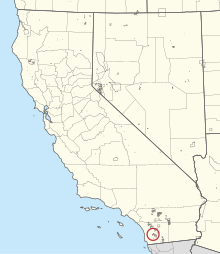| Total population | |
|---|---|
| 490 | |
| Regions with significant populations | |
| United States (California) | |
| Languages | |
| Ipai, Tipai, English | |
| Religion | |
| Traditional tribal religion, Christianity (Roman Catholicism) | |
| Related ethnic groups | |
| other Kumeyaay tribes, Cocopa, Quechan, Paipai, and Kiliwa |
| Barona Reservation | |
|---|---|
| Reservation | |
| Coordinates: 32°57′N 116°50′W / 32.950°N 116.833°W / 32.950; -116.833 | |
| Country | United States |
| State | California |
| Population | |
| • Total | 125 |
The Barona Group of Capitan Grande Band of Mission Indians of the Barona Reservation is a federally recognized tribe of Kumeyaay Indians, who are sometimes known as Mission Indians.
Reservations

In 1875, the tribe, along with the Viejas Group of Capitan Grande Band of Mission Indians, controlled the Capitan Grande Reservation, which consisted of barren, uninhabitable mountain lands. The El Capitan Reservoir, forcibly purchased from the two tribes to provide water for San Diego, submerged what habitable land existed on the reservation. The two tribes jointly control this reservation. It is undeveloped but serves as an ecological preserve.
The Barona Reservation (32°57′19″N 116°50′39″W / 32.95528°N 116.84417°W / 32.95528; -116.84417) is a federal Indian reservation located in San Diego County, California, near Lakeside and the Cleveland National Forest. It takes its name from the Mexican land grant Cañada de San Vicente y Mesa del Padre Barona, named in turn after Padre José Barona, a friar at Mission San Diego de Alcalá from 1798 until he transferred to Mission San Juan Capistrano in 1811. Founded in 1932, the reservation covers 5,181 acres (20.97 km). Much of the highland valley has good farmland. The reservation hosts several ranches, a chapel, tribal offices, a community center, and a ballpark created by the tribe. In 1973, 125 of the 156 enrolled members lived on the reservation. The nearest community is San Diego Country Estates, which adjoins the reservation's northeast side.
Government
The Barona Band of Mission Indians is headquartered in Lakeside, California. They are governed by a democratically elected, seven-person tribal council, who serve four-year terms. As of May 2024, the council members are:
- Raymond Welch, Chairman
- Mary Beth Glasco, Vice-Chairwoman
- Delia Castillo, Councilwoman
- Joseph Banegas, Councilman
- Tawyna Phoenix, Councilwoman
- Manuel Navarro, Councilman
- Joseph Yeats, Councilman
Economic development
The tribe owns and operates Barona Resort & Casino, Barona Creek Golf Club, Barona Steakhouse, Sage Café, HoWan Noodle Shop, and several other restaurants, all in Lakeside. The tribe is developing an energy project for 2026, partially funded by the California Energy Commission.
Bibliography
- Eargle, Dolan H. Jr. (2000). Northern California Guide: Weaving the Past and Present. San Francisco: Tree Company Press. ISBN 0-937401-10-2.
- Fetzer, Leland (2005). San Diego County Place Names A to Z. San Diego, California: Sunbelt Publications. ISBN 978-0-932653-73-4.
- Pritzker, Barry M. (2000). A Native American Encyclopedia: History, Culture, and Peoples. Oxford: Oxford University Press. ISBN 978-0-19-513877-1.
- Shipek, Florence C. (1978). "History of Southern California Mission Indians". In Heizer, Robert F. (ed.). Handbook of North American Indians. Vol. 8: California. Washington, DC: Smithsonian Institution. pp. 610–618. ISBN 0-87474-187-4.
References
- ^ White, Phillip. "California Indians and Their Reservations: An Online Dictionary". SDSU Library and Information Access. Retrieved October 10, 2016.
- ^ Shipek, 612
- ^ Eargle, 201
- ^ Pritzker, 147
- Eargle, 202
- Fetzer, 8
- "Barona Band of Mission Indians – SCTCA". sctca.net. Retrieved 2024-05-23.
- "Government". Barona Tribe. Retrieved 2024-05-23.
- "Barona Casino". 500 Nations. Retrieved October 10, 2016.
- "Redflow tapped as preferred battery provider for a fourth major California project". RenewEconomy. 7 February 2024.
External links
- Barona Band of Mission Indians, official website
| Mission Tribes of California | |
|---|---|
